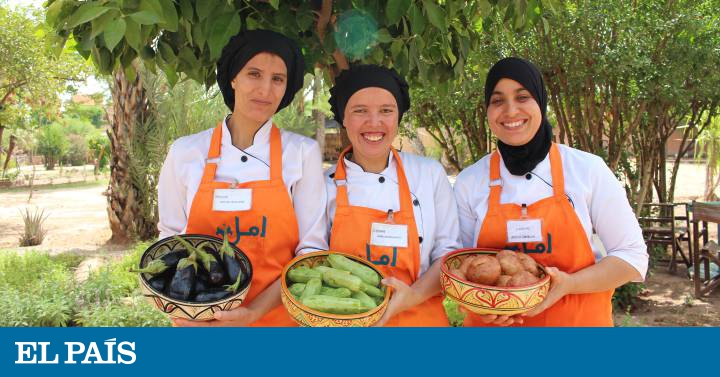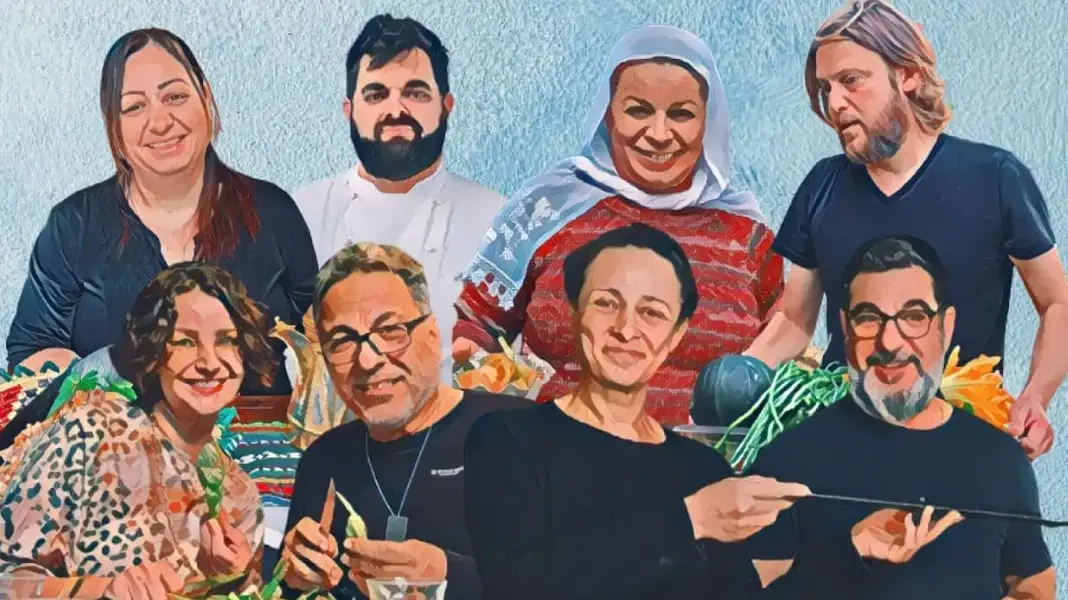Zineb was just six years old when her father sent her to live with another family. Thinking that she was going on vacation to some unknown place, she soon discovered that she had been sent to a house to do the dishes, clean and take care of the owners' children. Working conditions were extremely harsh for her and she was continually mistreated. For years, Zineb tried to run away, but when her father found her, she was sent back to the same place, to work. Any effort to change their situation was futile.
MORE INFORMATION
The revolutionary grandmothers who light up rural Africa- Ceviche, coconut water and female empowerment
- Computers against gender violence
One day Zineb said "enough" and decided to run away. He moved from one place to another in search of a job that would guarantee him some money. In 2014 she gave birth to her first daughter and became a single mother, something not easy in Morocco, a country where women in their situation are completely unprotected. Her luck began to change when an organization recommended that she go to a training center to learn new skills that would allow her to be financially independent and support her girl.
The center is called Amal and, as their public relations explains, Abla Terrab Maskri, the project they are running seeks to "empower women" through cooking in a city like Marrakech, where there is a flourishing tourism industry and many jobs in this sector.
Amal's students, dressed in white chef's robes, orange aprons, and black hijabs, work tirelessly throughout the day in the kitchen learning the trade. The organization trains about 35 students per course. There they learn to prepare Moroccan dishes such as couscous and tajine, as well as classics of international cuisine such as pizza and pasta. The project has become known for its good work and excellent cuisine. In fact, her restaurant is popular in Marrakech and has a privileged location on TripAdocu.
Terrab Maskri says that the program offers training "to women who are in a vulnerable situation, such as divorced, widowed, orphaned or single mothers." For many of them this is the first formal education they receive, as is the case of Aicha, another of the project's members. She did not have the opportunity to study because her father forced her to leave school when she was still very young to help her mother at home.
Amal seeks to empower women through cooking in Marrakech, where there is a burgeoning tourism industry
During her childhood, Aicha was not even allowed to leave home too often. Most of her older brothers married and became independent, leaving her in charge of taking care of the parents. Her mother died of cancer and her father died the same month from a car accident. Aicha was sent to live among relatives, going from house to house of aunts, uncles and cousins, without experience or control over her life.
As Stephanie Willman Bordat, founding partner of the Mobilizing for Rights Associates, an NGO in North Africa, explains, the Moroccans she works with on the project, widows, separated, single and divorced mothers, "are discriminated against in the legal framework, especially the Family Code and the Penal Code ”.
A main challenge for them is the economic factor. Divorced women in particular, and also their children, are very vulnerable to poverty after divorce, because the ex-wife does not receive alimony or share the assets acquired during the marriage, such as housing. "Child support orders are generally low, and even when they are granted, women find it difficult for the court to execute these orders because they cannot find the father, or he refuses to pay," Willman says.
Divorced women in Morocco do not receive alimony or share the assets acquired during the marriage
At the same time, women have limited decision-making power over their children, such as their schooling, where to live, or other legal acts because the father remains the legal guardian of the children, and is in charge of decision-making and matters. financial. A mother who remarries or wants to move to another place in Morocco risks losing custody.
Willman explains that widows are also financially vulnerable due to the unequal inheritance fees they receive, and that other family members often find ways, taking advantage of their illiteracy, for example, not to give them their share.
In the case of single women, they are deprived of any intimate relationship, since having sex outside of marriage is illegal under the Penal Code. This means that these women cannot take advantage of the new Law 103-13 on sexist violence. “Although this norm penalizes all forms of violence against them, the fact that sexual relations outside of marriage are illegal means that those that are mistreated by an intimate partner with whom they are not married cannot file a complaint because they would be arrested, ”adds Willman.
Behind Amal's project is Nora Fitzgerald, an American born and raised in Morocco who started a baking project in 2012 with two Moroccans whom she wanted to help create a livelihood so they could support themselves and their children. "What started as a hopeful idea with a few women baking and selling cakes has now grown into a structured organization with two training centers," says the founder.
Widows receive unequal inheritances, and often other family members find ways not to give them their share
Terrab Maskri, the project's public relations, says they continue to receive applications and that choosing the candidates is a difficult task. When selecting, they want future students to be between 18 and 35 years old, with low income levels and eager to learn.
During the six-month training program, the women learn all aspects of the restaurant industry, such as cooking, cleaning, serving, and a few brushstrokes of French and English to communicate with customers. After completing the course, they do two weeks of practice to gain real-world experience, and this often leads to a job offer. Otherwise, the organization helps recent graduates find a job.
As Terrab Maskri explains, “the training is free” because the students “have already faced too much exclusion”. Participants are paid throughout the training period and those with children have an additional allowance per child to help with their care when they are away from home. The students also receive a local bus card that allows them four free trips each day.
Terrab Maskri is proud that Amal "is a self-sufficient organization". Initially, the project was financed by private donations from family and friends, in addition to conducting some fundraising campaigns on the Internet. The main change came from the funds of its partners in the Droso Foundation, an NGO based in Zurich, allowing them to establish themselves professionally.
Today Amal's income comes from cooking classes for guests, her catering service and the restaurant, earnings that allow them to pay the rent, daily expenses and electricity, you pay the students and staff. Now Zineb is a graduate and has a steady job in the kitchen of a riad. Many other graduate women are following in her footsteps.
You can follow PLANETA FUTURO on Twitter and Facebook and Instagram, and subscribe here to our newsletter.









